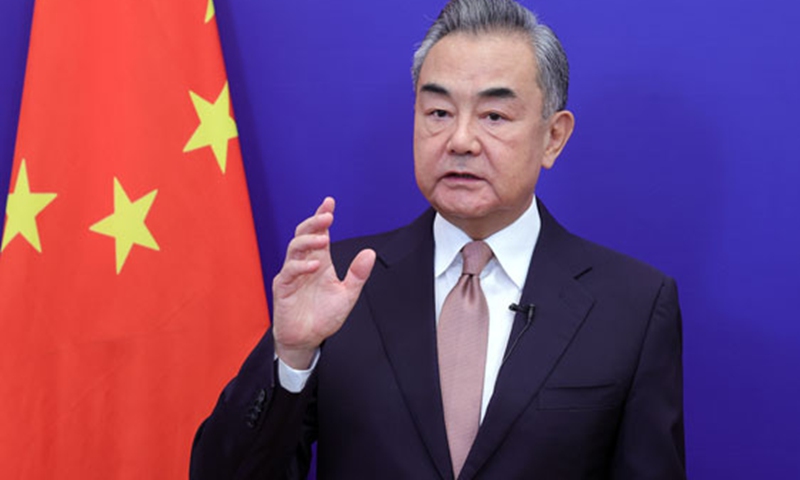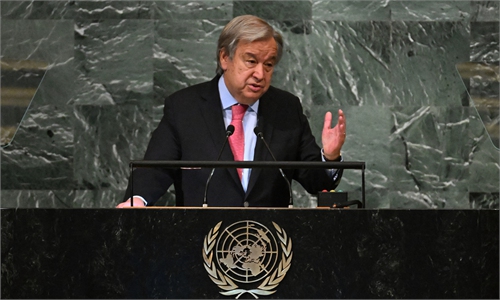
Chinese State Councilor and Foreign Minister Wang Yi
Chinese State Councilor and Foreign Minister Wang Yi made four-point proposals in addressing the global climate change on Wednesday during the ongoing UN General Assembly (UNGA), stressing that countries should not abandon the efforts in energy restructuring because of the COVID-19 outbreak or the energy crisis, developed countries should achieve carbon neutrality significantly in advance, making room for developing countries.
During a private meeting of Heads of State and Government held on Wednesday at UN Headquarters in New York, UN Secretary-General António Guterres called for more action and leadership to tackle the climate crisis, warning that efforts to keep the rise in global temperatures to 1.5 degrees above pre-industrial levels is "on life support," according to the UN website.
The meeting was billed in advance as a "frank and informal exchange" of views between leaders, co-chaired by Guterres and Egypt's President Abdel Fattah Al Sisi, and an opportunity to address key issues ahead of the COP27 UN Climate Change conference, which is to be held in the Egyptian resort of Sharm El-Sheikh in November, the website showed.
In addressing the meeting, Wang suggested that the countries should follow the principle of common but differentiated responsibilities, taking action to meet the temperature control targets set by the Paris Agreement with accelerated speed.
China supports the universal early warning systems initiated by Guterres, and developed countries should fulfill their commitments and provide financial, technological and capacity-building support to developing countries, Wang said.
During the same address, he also called on the countries to push forward the green energy restructuring plan in a practical way, and they should not abandon their efforts because of the COVID-19 outbreak or the energy crisis. Traditional energy should be gradually withdrawn on the basis of safety and reliability of new energy sources, Wang said. And under the framework of sustainable development, countries should promote a high-quality and fair energy transformation.
In recent weeks, the record heat waves alongside an energy crisis partly caused by the US-instigated Russia-Ukraine crisis have forced some European countries to row back on their climate goals. Meanwhile, in the US, one of the world's biggest emitters, climate change has descended to an issue for partisan struggle.
The city of Copenhagen has given up on its long-term goal of becoming carbon neutral by 2025 in late August, and the decision was made after several European countries, including Germany, France, Italy, Spain and the Netherlands, had already or are planning to return to coal to generate electricity, after they felt the pinch from energy crisis following the Russia-Ukraine crisis.
Also on Wednesday, China's climate envoy held a video conference with the German climate envoy Jennifer Morgan. Xie Zhenhua pointed out that the current global climate governance faces multiple challenges and uncertainties, and some European countries have been moving backwards in their climate policies.
Xie hoped that it's only expedient measure as all countries should take positive measures to implement mid- and long-term climate change targets. Developed countries are expected to fulfil their commitment of providing at least $100 billion a year to developing countries to enhance mutual trust in fighting climate change.
Wang said all sides should give up the unilateral stance and geopolitical wrestling in handling the global challenges, and developed countries should achieve carbon neutrality in advance, making room for the developing countries and rebuilding trust.
Although the floods in Pakistan and droughts in Europe and China have been caught in the public attention in recent weeks, the climate change has not been at the top of the agenda at the UNGA this week as the US-led Western countries put more focus on the Ukraine crisis and condemning Russia.
Besides making concrete suggestions, the Chinese Foreign Minister reiterated that China unswervingly gives priority to ecology and pursues green and low-carbon development, as the country has announced the carbon peak and carbon neutrality targets, and will achieve the world's highest carbon emission intensity reduction.
China is also steadily promoting energy restructuring as the country is ranked the first in installed wind power and photovoltaic power generation in the world, and the production and sales of new energy vehicles rank first in the world.
It also strictly controls carbon dioxide emissions. By 2020, carbon dioxide emissions per unit of GDP will be reduced by 48.4 percent from the figures in 2005, and by more than 65 percent when comparing 2005 to 2030, and the country has established a national carbon market mechanism to become the world's largest carbon market covering greenhouse gas emissions, Wang said.
In response to whether China will adjust its carbon peak and carbon neutrality targets as some European countries have restarted coal power production, Liu Dechun, director of the resource conservation and environmental protection department of the National Development and Reform Commission, told at a press conference on Thursday, that to achieve those targets is a solemn presentation made by China to the world, and China will surely achieve those targets as scheduled.

